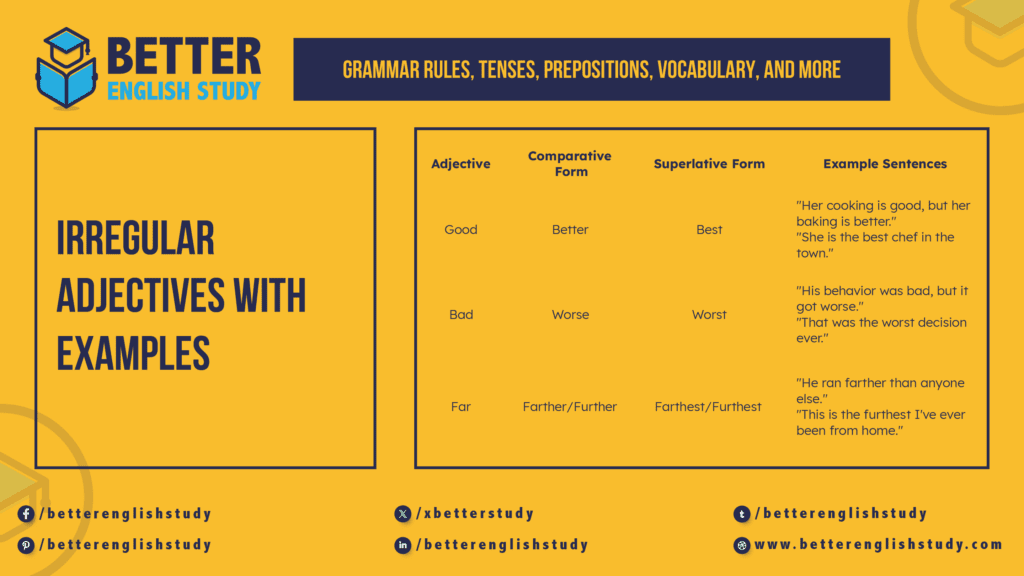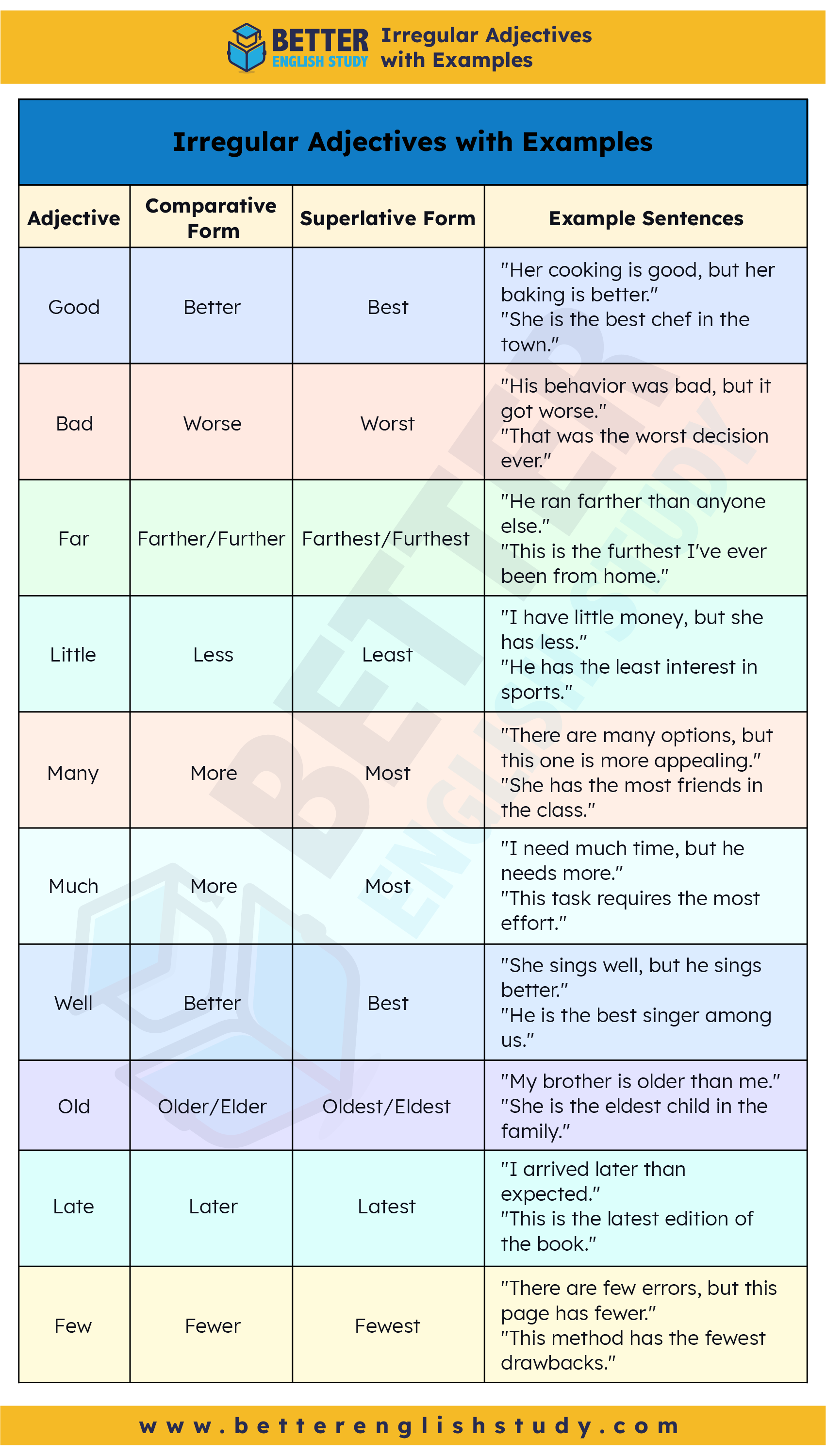
English adjectives often follow predictable patterns when forming their comparative and superlative forms. However, some adjectives break these rules. These are known as irregular adjectives. Understanding irregular adjectives is crucial for mastering English grammar and ensuring accurate communication.
This article will explore what irregular adjectives are, provide examples, and explain how to use them correctly.
What Are Irregular Adjectives?
Irregular adjectives are adjectives that do not follow the standard rules for forming their comparative and superlative forms. While most adjectives add “-er” and “-est” or use “more” and “most” for their comparative and superlative forms, irregular adjectives change in unpredictable ways.
Examples of Irregular Adjectives
Here are some common irregular adjectives and their comparative and superlative forms:
- Good: better (comparative), best (superlative)
- Bad: worse (comparative), worst (superlative)
- Far: farther/further (comparative), farthest/furthest (superlative)
- Little: less (comparative), least (superlative)
- Many: more (comparative), most (superlative)
- Much: more (comparative), most (superlative)
How to Use Irregular Adjectives in Sentences
Using irregular adjectives correctly involves knowing their unique comparative and superlative forms. Here are detailed explanations and examples:
1. Good
- Comparative: better
- Superlative: Best
Example Sentences:
- Her performance was better than his.
- She is the best singer in the choir.
2. Bad
- Comparative: worse
- Superlative: worst
Example Sentences:
- His handwriting is worse than mine.
- This is the worst meal I’ve ever had.
3. Far
- Comparative: farther/further
- Superlative: farthest/furthest
Example Sentences:
- She lives farther from the city than I do.
- This is the furthest I’ve ever traveled.
4. Little
- Comparative: less
- Superlative: least
Example Sentences:
- He has less money than his brother.
- She is the least experienced member of the team.
5. Many
- Comparative: more
- Superlative: most
Example Sentences:
- There are more apples in this basket.
- She has the most friends in the class.
6. Much
- Comparative: more
- Superlative: most
Example Sentences:
- He needs more time to finish the project.
- This task requires the most effort.

Understanding the Differences
1. Standard Adjectives
Standard adjectives form their comparative and superlative forms by adding “-er” and “-est” or using “more” and “most.”
Example:
- Tall: taller (comparative), tallest (superlative)
2. Irregular Adjectives
Irregular adjectives do not follow these standard patterns and must be memorized.
Example:
- Good: better (comparative), best (superlative)
Common Mistakes and Tips
1. Confusing Comparative and Superlative Forms
Ensure you use the correct form for comparison. “Better” is comparative, while “best” is superlative.
Incorrect: She is the better student in the class.
Correct: She is the best student in the class.
2. Using Regular Patterns for Irregular Adjectives
Avoid applying regular patterns to irregular adjectives.
Incorrect: His performance was gooder than hers.
Correct: His performance was better than hers.
3. Mixing Forms
Don’t mix up the comparative and superlative forms of irregular adjectives.
Incorrect: This is the more far I’ve ever traveled.
Correct: This is the farthest I’ve ever traveled.
Summary Table of Irregular Adjectives with Examples
| Adjective | Comparative Form | Superlative Form | Example Sentences |
| Good | Better | Best | “Her cooking is good, but her baking is better.” “She is the best chef in the town.” |
| Bad | Worse | Worst | “His behavior was bad, but it got worse.” “That was the worst decision ever.” |
| Far | Farther/Further | Farthest/Furthest | “He ran farther than anyone else.” “This is the furthest I’ve ever been from home.” |
| Little | Less | Least | “I have little money, but she has less.” “He has the least interest in sports.” |
| Many | More | Most | “There are many options, but this one is more appealing.” “She has the most friends in the class.” |
| Much | More | Most | “I need much time, but he needs more.” “This task requires the most effort.” |
| Well | Better | Best | “She sings well, but he sings better.” “He is the best singer among us.” |
| Old | Older/Elder | Oldest/Eldest | “My brother is older than me.” “She is the eldest child in the family.” |
| Late | Later | Latest | “I arrived later than expected.” “This is the latest edition of the book.” |
| Few | Fewer | Fewest | “There are few errors, but this page has fewer.” “This method has the fewest drawbacks.” |
Practice Makes Perfect
The best way to master irregular adjectives is through practice. Here are some exercises:
Fill in the Blanks
- Her score was _ (good) than mine. (Answer: better)
- This is the _ (bad) movie I’ve seen. (Answer: worst)
- He lives _ (far) from the office than I do. (Answer: farther/further)
- She has _ (many) books than her sister. (Answer: more)
- This task requires the _ (much) attention. (Answer: most)
Irregular adjectives are an essential part of English grammar. While they do not follow standard rules, understanding and using them correctly can greatly enhance your language skills. By memorizing their forms and practicing their usage, you can ensure your English is accurate and effective.
FAQs About Irregular Adjectives
What makes an adjective irregular?
An adjective is considered irregular if it does not follow the standard rules for forming comparative and superlative forms, such as adding “-er” and “-est” or using “more” and “most.”
Are there many irregular adjectives in English?
A few commonly used irregular adjectives, such as good, bad, far, little, many, and much, are essential to learning as they are frequently used in everyday language.
How can I remember irregular adjectives?
Practice and repetition are key. Flashcards, writing exercises, and regular use in conversation can help solidify your understanding and recall of irregular adjectives.
Can an adjective be both regular and irregular?
Generally, an adjective is either regular or irregular. However, “far” is an exception as it has two correct comparative and superlative forms: farther/farthest and further/furthest.
Why are irregular adjectives important?
Irregular adjectives are important because they are commonly used and essential for clear and accurate communication. Mastering them helps in making precise comparisons and descriptions.
Understanding irregular adjectives and their proper usage is a fundamental aspect of mastering English. With practice and attention to these unique forms, you can improve your grammatical accuracy and enhance your overall language skills.
